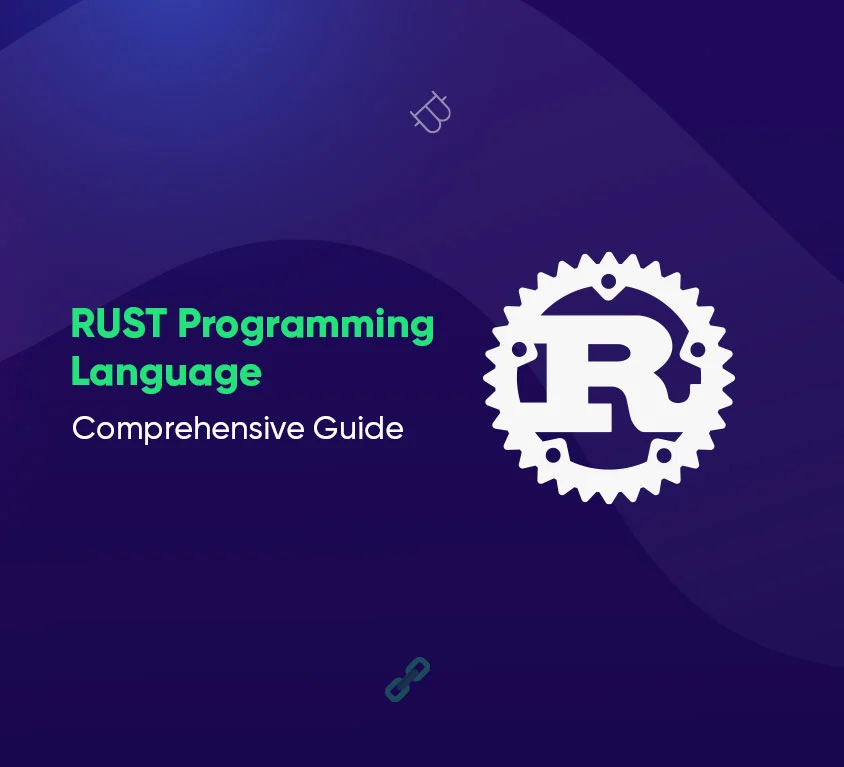
Introduction
Blockchain & Web3 Services Trusted By Leaders
- Develop innovative solutions using our state-of-the-art blockchain expertise.
- Achieve accelerated growth with robust & scalable Web3 consulting.
- Unlock 360-degree security with our top-rated blockchain development.
RUST Programming Language: Comprehensive Guide
RUST programming language has become popular as a desirable option for many different kinds of applications. It serves as a potent and adaptable tool, focusing on concurrency, memory safety, and performance. Being a powerful tool, it can be used for a wide range of tasks, from complex blockchain development projects to the challenging hiring of RUST developers. Whether you’re intrigued by the Rust functional programming aspects or eager to explore its applications in specialized domains, this guide is designed to cater to your curiosity and provide valuable insights. Let’s travel through the foundations, what is rust? features that make RUST unique, examine practical applications, and traverse the vibrant ecosystem that fosters RUST development in this guide.What is Rust Programming Language?
A memory-safe compiled programming language that delivers high-level simplicity with low-level performance. It’s a well-liked option for developing systems like operating systems, game engines, and databases where performance is vitally important. It’s a great option if you’re aiming for webassembly. It began as a side project of Great in 2007, who called it after the RUST fungus. In 2009, Mozilla sponsored it, and since then, it has consistently been ranked as the most popular programming language. In other words, Rust is the best programming language for developing a blockchain app that has a multi-paradigm focus that prioritizes performance, type safety, and concurrency. Notably, Rust maintains memory safety without depending on automatic garbage collection or other memory management techniques. This indicates that a requirement enforced by the language is that all references point to legitimate memory locations.What is Rust Used for?
Rust is a great choice for bare-metal development and embedded systems because it has direct access to both memory and hardware. Additionally, it can be applied to a wide range of tasks because it is a general-purpose language. Let’s examine several important use cases: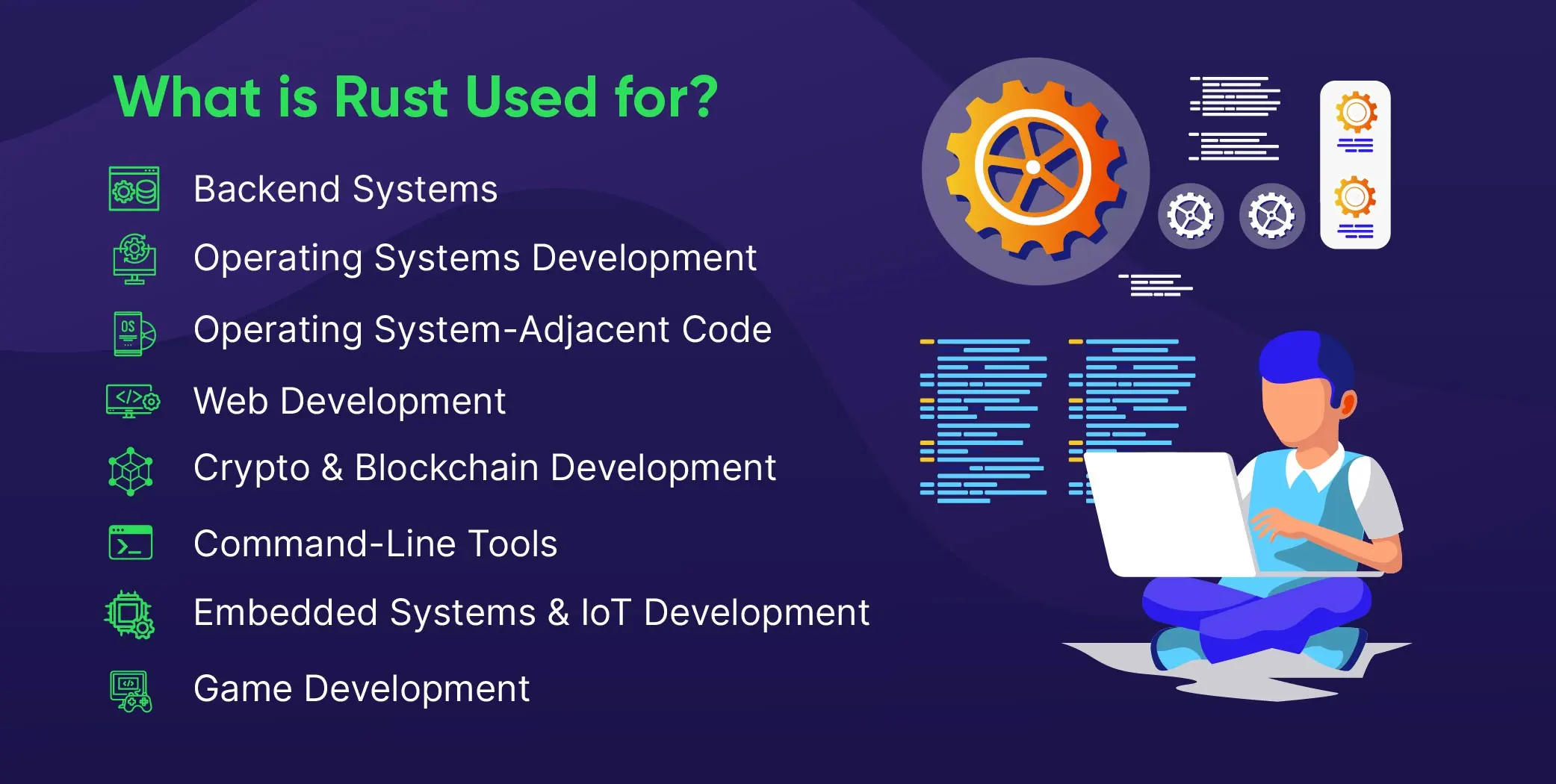
1. Backend Systems
Rust excels in crafting backend systems that demand high-speed processing, low-latency responses, and efficient resource utilization. Its robust performance, thread safety, and effective error handling make it an ideal choice for developing components like GitHub’s code search backend, showcasing Rust’s real-world application in performance-critical scenarios.
2. Operating Systems Development
Initially conceived to address operating system challenges, Rust continues to play a pivotal role in building operating systems, kernels, device drivers, and low-level components. Notable examples include the Rust-based Redox operating system and Google’s Fuchsia, illustrating Rust’s relevance in the realm of OS development.
3. Operating System-Adjacent Code
Rust is adept at writing code that closely interacts with the operating system, optimizing tasks such as virtual disk startup and storage utilization. GitHub’s Codespaces leverages Rust for enhanced speed, while Coursera employs it in its online grading system within Docker, emphasizing Rust’s applicability in OS-adjacent domains.
4. Web Development
Rust’s foray into web development, particularly on the server side, is marked by its async programming model and performance characteristics. Its application in high-performance web servers, APIs, and backend services is complemented by the emergence of Rust web frameworks like Rocket, reinforcing Rust’s maturity in both front and backend web development.
5. Crypto and Blockchain Development
The speed, memory management, and security features of Rust find a natural fit in the realm of cryptocurrency and blockchain technologies. Blockchain platforms like Polkadot leverage Rust for building core infrastructure, showcasing its role in developing secure and decentralized blockchain applications.
6. Command-Line Tools
Rust’s ability to compile efficient machine code and its expressive syntax make it an excellent choice for building command-line tools. Its role in crafting efficient and powerful CLI applications is exemplified by its use in various projects, providing a great avenue for developers to explore and learn Rust.
7. Embedded Systems and IoT Development
Rust’s minimal runtime and control over memory layout make it highly valuable for embedded systems and IoT development. Its capability to prevent memory-related bugs, manage concurrency, and generate small, efficient binaries aligns well with the security and efficiency requirements of IoT applications.
8. Game Development
Rust’s focus on performance and memory safety makes it a suitable choice for game development. It is used to build game engines, components, and tools, providing a balance between high performance and robust memory management.
Why use Rust Programming Language?
- Rust Foundation backing: Rust, backed by Microsoft, Meta, Dropbox, Arm, Google, Amazon, and others, gained popularity during the COVID-19 economic meltdown.
- Modern alternative to C++: Rust bypasses C++ bugs and matches C++ compiling speeds.
- Official package manager Cargo: Cargo bypasses recompilation by checking dependencies.
- Superior memory management: Rust simplifies memory allocation and de-allocation, allowing for multiple smart pointers to share the same data.
- Mastering concurrency: Rust provides a bug-free, easy-to-refactor code-writing approach.
- WebAssembly support: Rust supports creating various web-based applications.
- Growth: Linus Torvalds plans to use Rust in Linux Kernal in 2023.
Features of Rust Programming Language
Following are some more of its cherished attributes and features: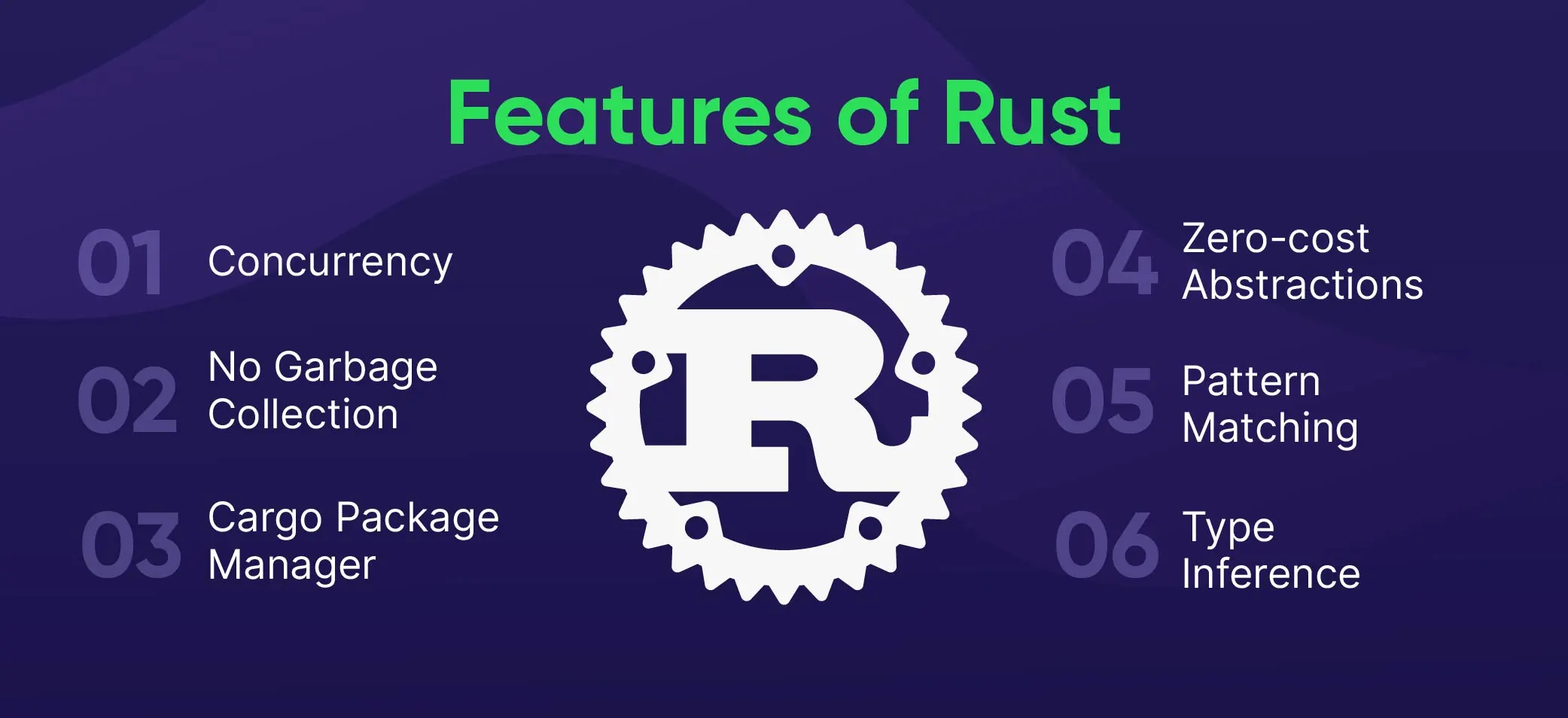
- Concurrency: Rust’s ownership system and borrowing model enforce strict rules for data access, allowing multiple threads to work on shared data without memory-related issues.
- No Garbage Collection: Rust’s ownership and borrowing rules manage memory, empowering developers with precise control over memory allocation and deallocation.
- Cargo Package Manager: Rust’s built-in package manager streamlines project management, dependency tracking, and building, contributing to efficient development workflows.
- Zero-cost Abstractions: This feature allows developers to write high-level code abstractions without introducing runtime performance overhead.
- Pattern Matching: This feature enables developers to match complex data structures against specific patterns for clean and readable handling.
- Type Inference: Rust’s compiler automatically detects expressions based on context while coding.
The Rust Ecosystem
The Rust programming language boasts a dynamic and thriving ecosystem, a testament to the passion and dedication of its community. Within this rich landscape, developers can explore a diverse array of libraries, packages, frameworks, and tools tailored to elevate their Rust coding experience.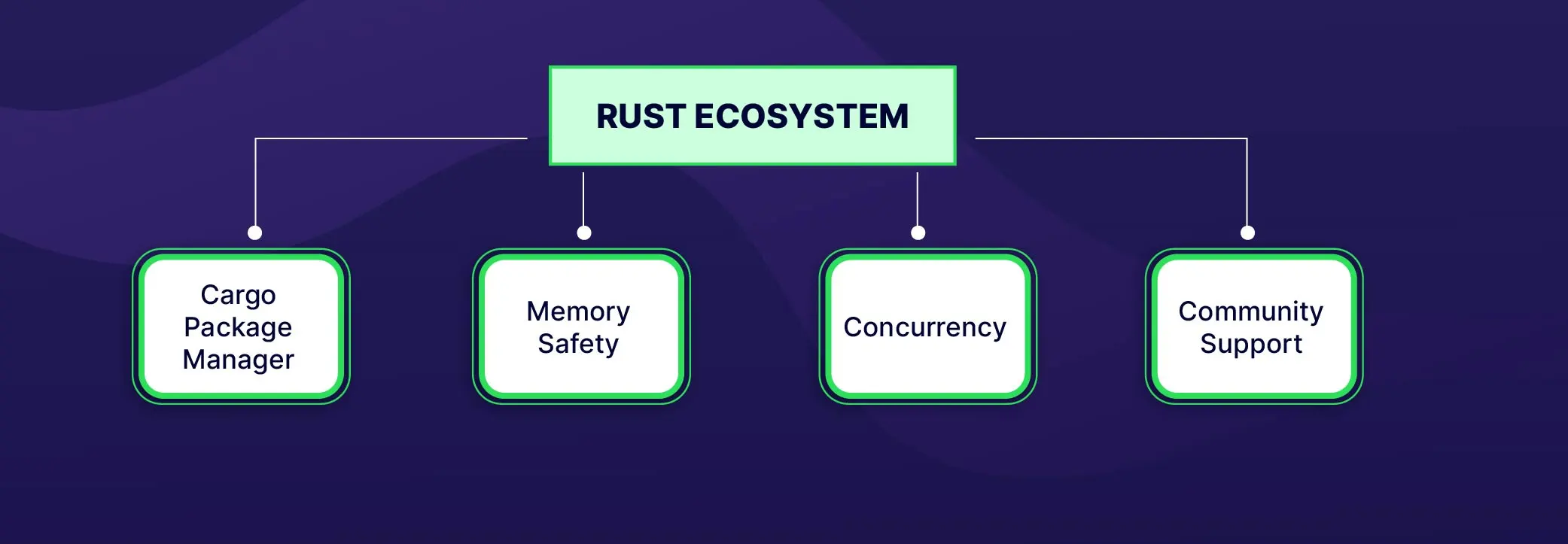 A community-curated list of resources is ready for those who are ready to delve into the sea of Rust resources. This unofficial compilation, a labor of love from the community, acts as a compass to help developers navigate the wealth of options available in the Rust ecosystem.
A community-curated list of resources is ready for those who are ready to delve into the sea of Rust resources. This unofficial compilation, a labor of love from the community, acts as a compass to help developers navigate the wealth of options available in the Rust ecosystem.
- Customizing the Toolkit
As Rust developers embark on their coding journey, the abundance of resources allows for tailoring the toolkit to suit specific project requirements and individual tastes. Whether it’s crafting a sleek web application or delving into systems programming, the Rust ecosystem offers a spectrum of options waiting to be harnessed.
- Cargo: Getting Across the Dependency Seas
The cherished package manager, Cargo, is the center of the Rust ecosystem. By making it easier to publish Rust packages to the official registry, Cargo gives developers the ability to more easily manage dependencies and optimize project workflows.
- Libraries that Inspire
Actix, Rocket, Diesel, Serde, and Tokio are well-known Rust library superstars that offer distinctive features to a variety of projects. These libraries are the cornerstones of innovation, empowering programmers to create complex yet effective solutions.
- Tools that Perfect and Polish
Rustfmt, Clippy, and Rust Language Server stand out as unsung heroes in the tool world. Rustfmt ensures code uniformity and elegance, while Clippy offers valuable insights for enhanced quality. The Rust Language Server is a lighthouse that provides strong error checking and guidance to make the coding process more visible.
- Beyond the Horizon
The list of names provided is only a small sampling of the extensive Rust resources that are out there. The community, an active force for cooperation, has put together an unofficial but thorough list that highlights the variety of tools and libraries available. This group effort is a reflection of the dedication and openness that characterize Rust’s journey.
Tools and Libraries for Rust Development
| Category | Name | Description |
|---|---|---|
| Package Manager | Cargo | The official Rust manager, facilitating the management and publication of Rust packages. |
| Web Frameworks | Actix, Rocket | Actix and Rocket are robust web frameworks for building efficient and scalable web applications. |
| Database ORM | Diesel | Diesel is a powerful, type-safe ORM (Object-Relational Mapping) for Rust, aiding database interactions. |
| Serialization | Serde | Serde is a framework for efficient serialization and deserialization of Rust data structures. |
| Asynchronous Runtime | Tokio | Tokio provides an asynchronous runtime for building concurrent and scalable applications. |
| Code Formatter | Rustfmt | Rustfmt ensures consistent and elegant code formatting, promoting a unified coding style. |
| Linting | Clippy | Clippy is a collection of links to catch common mistakes and improve code quality. |
| Language Server | Rust Language Server | The Rust Language Server enhances IDE support by providing features like autocompletion and error checking. |
Rust Programming Language for Blockchain Development
Rust has gained popularity in blockchain development due to its unique combination of performance, memory safety, and robust type system.Here’s Why Rust is a Compelling Choice for Blockchain Development:

-
Performance
Rust’s emphasis on zero-cost abstractions and control over low-level details makes it well-suited for building high-performance blockchain applications. The language allows developers to achieve efficient resource utilization, a critical aspect of blockchain systems handling transactions and smart contracts.
-
Memory Safety
Rust’s ownership system and borrowing mechanisms contribute to strong memory safety guarantees, reducing the risk of common vulnerabilities such as buffer overflows and null pointer dereferences. In blockchain applications, where security is paramount, Rust’s memory safety features provide a robust foundation for building reliable and secure systems.
-
Concurrency
Rust’s ownership model also facilitates safe concurrency, allowing developers to write concurrent code without the pitfalls of data races and other concurrency-related bugs. This is particularly advantageous for blockchain networks that often require handling multiple transactions simultaneously.
-
Community Support
The Rust community actively contributes to blockchain-related projects and libraries, fostering an environment of collaboration and knowledge sharing. There are various Rust libraries and frameworks, such as Parity Substrate, that provide tools for building custom blockchains and decentralized applications.
-
Tooling
Rust benefits from a rich set of development tools, including Cargo (Rust’s package manager), which simplifies the management of dependencies and project configurations. The availability of tools like Rust-analyzer and Rustfmt further enhances the development experience for blockchain projects.
-
Interoperability
Rust’s interoperability with other languages allows developers to integrate Rust components with existing blockchain ecosystems or use specialized libraries written in different languages.
-
Parity Substrate
Parity Substrate is a blockchain development framework written in Rust. It enables the creation of customizable blockchains and simplifies the development of decentralized applications. Substrate’s modular architecture allows developers to tailor blockchain components to their specific requirements.
-
Polkadot Ecosystem
Polkadot, a multi-chain blockchain platform, utilizes Rust for building its core infrastructure. This demonstrates Rust’s role in the development of interoperable and scalable blockchain networks.
In conclusion, Rust’s performance, memory safety, and strong community support make it a compelling choice for blockchain development. Whether you need to develop blockchain from scratch or contribute to existing projects, Rust provides the tools and features necessary to create secure, efficient, and reliable blockchain systems.Rust: A Versatile Programming Language
- Systems Programming: Ideal for developing system-level applications like operating systems, device drivers, and low-level components.
- Web Development: Ideal for building high-performance web servers, APIs, and backend services due to its asynchronous programming model and performance characteristics.
- Blockchain and Cryptocurrency: Popular choice for blockchain development due to its speed, memory management, and security features.
- Networked Services: Excellent for building networked services like chat servers, game servers, and distributed systems.
- Command Line Tools: Compilation to efficient machine code and expressive syntax make it a strong choice for command line tools and applications.
- IoT Development: Minimal runtime and control over memory layout make it useful for developing embedded systems and IoT devices.
- Desktop Applications: Can be used for building cross-platform desktop applications.
- Game Development: Suitable for writing game engines and components.
- Data Processing and Analysis: Suitable for applications involving data processing, analysis, and scientific computing.
- Artificial Intelligence and Machine Learning: Viable for certain AI and ML applications due to its speed and ability to interface with other languages.
Advantages and Disadvantages of Rust Coding
| Advantages of Rust Coding | Disadvantages of Rust Coding |
|---|---|
| 1. Memory Safety: Rust’s ownership system eliminates common memory-related bugs, promoting secure and reliable code. | 1. Learning Curve: Rust has a steeper learning curve, especially for developers transitioning from languages with automatic memory management. |
| 2. Performance: Rust provides low-level control and efficient abstractions, resulting in high-performance applications. | 2. Borrowing and Lifetimes: Understanding and managing borrowing and lifetimes, while essential for memory safety, can be challenging for some developers. |
| 3. Concurrency: Rust’s ownership model facilitates safe concurrency, making it easier to write concurrent and parallel code. | 3. Limited Ecosystem: Although growing, Rust’s ecosystem may lack certain libraries and frameworks compared to more established languages. |
| 4. Zero-Cost Abstractions: Rust allows developers to use high-level abstractions without incurring runtime overhead. | 4. Verbosity: Some developers find Rust code more verbose compared to other languages, impacting readability for certain individuals. |
| 5. Strong Typing: Rust’s strong and static typing helps catch errors at compile-time, reducing runtime surprises. | 5. Tooling Maturity: While improving, Rust’s tooling (IDE support, debugging) may not be as mature as that of some other languages. |
| 6. Concurrency without Data Races: Ownership and borrowing prevent data races, ensuring safe concurrent programming. | 6. Complex Error Handling: Rust’s emphasis on explicit error handling may lead to more verbose code for certain scenarios. |
| 7. Community Support: Rust has a vibrant and supportive community, contributing to the language’s growth and development. | 7. Limited GUI Frameworks: GUI development in Rust may be constrained by the availability of mature GUI frameworks compared to other languages. |
| 8. Cross-Platform Compatibility: Rust’s support for cross-compilation allows developers to build binaries for various platforms from a single codebase. | 8. Limited Experience in Legacy Code: Rust might not be the preferred choice for integrating with legacy systems or codebases in some cases. |
| 9. Predictable Performance: Rust’s emphasis on predictability makes it suitable for performance-critical applications. | 9. Smaller Talent Pool: The Rust developer community, while growing, is smaller compared to more established languages, potentially impacting hiring. |
| 10. Ecosystem Growth: The Rust ecosystem is expanding with new libraries, frameworks, and tools regularly added. | 10. Stringent Borrow Checker: While essential for safety, the borrow checker can be strict, requiring careful management of references. |
Hire a Rust Developer
The need for hiring Rust developers is growing, and finding qualified developers is essential to completing projects successfully. There are so many benefits when you Hire a Rust developer, such as memory safety, high-performance application development, and systems programming experience. Seek applicants who have a thorough understanding of the concurrency model, ownership system, and building secure applications in Rust.What Does the Future Hold for Rust Programming?
Rust’s future looks bright, and several factors are fostering its steady growth: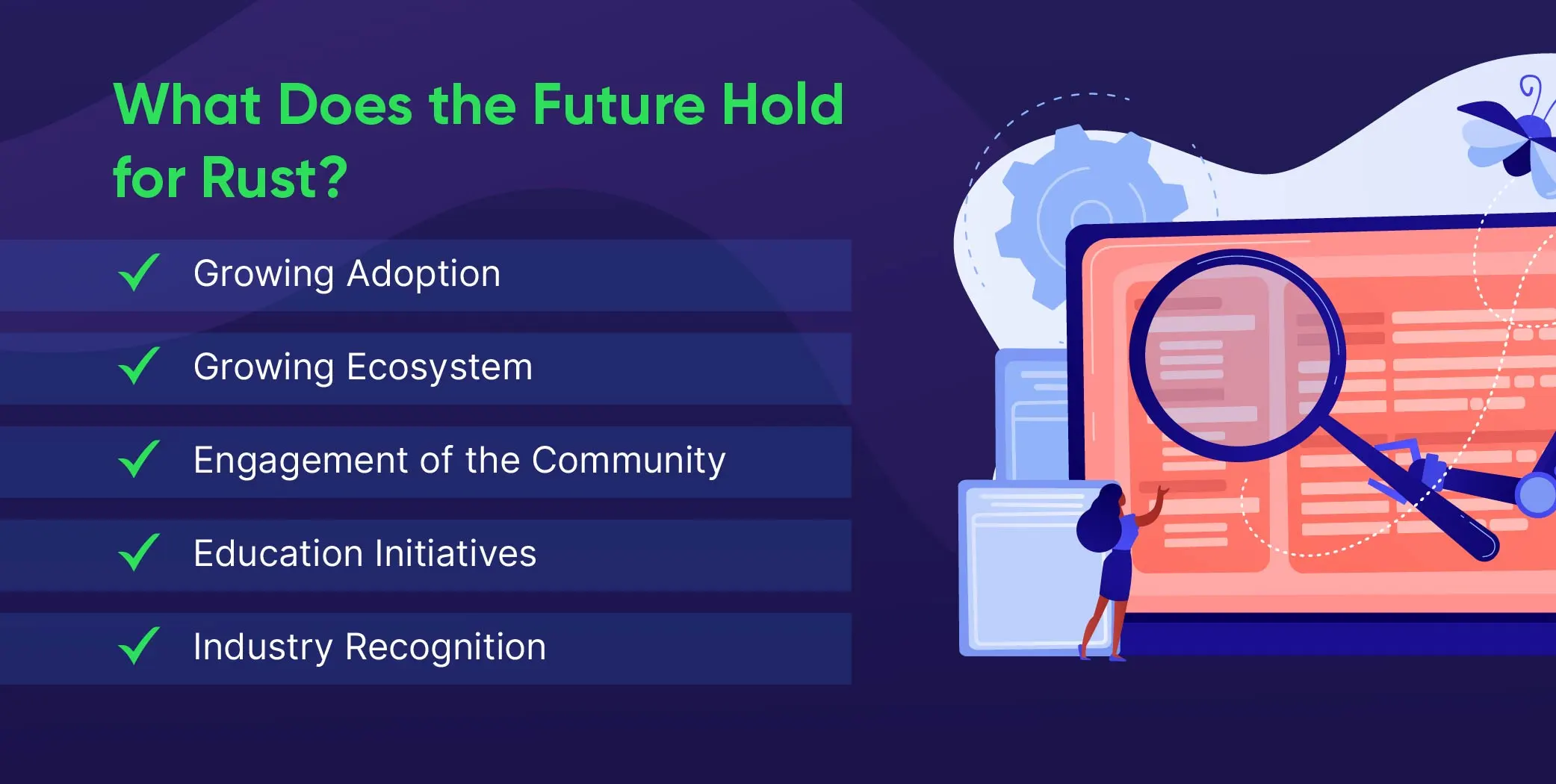
- Growing Adoption: Rust is becoming more and more popular in several fields, including blockchain, web development, and system-level programming. Rust is being incorporated into tech stacks by more businesses as they become aware of its advantages.
- Growing Ecosystem: With an increasing number of libraries, frameworks, and tools, the Rust ecosystem is maturing quickly. Rust’s adaptability is increased by this extension, making it a desirable option for a wider variety of applications.
- Engagement of the Community: Rust is being actively developed by its lively and involved community. This cooperative endeavor guarantees continuous enhancements, augmented documentation, and the dissemination of optimal methodologies.
- Education Initiatives: There is a growing trend of Rust-related educational programs and initiatives. Rust’s influence is expected to grow as more developers become familiar with it and adopt it, improving the development environment.
- Industry Recognition: Rust is becoming more and more known for its special features, which include memory safety without garbage collection and zero-cost abstractions. Rust is becoming more and more popular for projects in industries where security, performance, and dependability are top priorities.